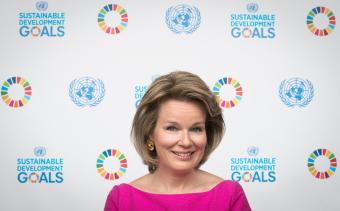Toespraak van Hare Majesteit de Koningin bij het bezoek aan de openingssessie van de European Development Days

(Toespraak uitgesproken in het Engels en Frans)
The urgency of taking concrete measures to implement Agenda 2030
Mr. President,
Your Excellencies,
Ladies and Gentlemen,
Four years ago, in November 2015, the international community made a joint commitment to implement the United Nations Agenda 2030. The Agenda aims to ensure that development is sustainable, by reconciling its economic, social and environmental aspects. The ultimate goal, of course, is to create more equitable and stable societies. And as such, its reach is universal. The Agenda advocates a genuine transformation of our models, taking into consideration the limits of our planet and the need to end injustice and discrimination.
Today, initial findings on the implementation of the Sustainable Development Goals are available, although the data remains fragmented. There is no doubt that we have made progress. Extreme poverty and infant mortality are declining. Globally, there have never been as many girls attending school. There are fewer early marriages, too. Worldwide, the number of people living in slums has decreased, while access to sanitary facilities and electricity has increased. Marine protection zones under national jurisdiction have multiplied. Numerous states, as well as local authorities, businesses, universities, associations and non-governmental organisations have adopted the goals as the framework for their strategies and activities.
But this autumn the Secretary General of the United Nations is convening two important summits. One will be devoted to the climate, the other to the Sustainable Development Goals. The Secretary General’s analysis is that progress in the implementation of the Sustainable Development Goals is too slow. And the progress that has been made is too disparate for us to achieve all of the goals by 2030.
Indeed, in certain areas, a significant proportion of the population has remained untouched by progress. In others, the tempo of the improvements is slackening and trends that have been positive till now are reversing. Access to drinking water is a case in point. The worrying trends in global warming, loss of biodiversity and the exploitation of natural resources are compromising the achievement of the other goals. We can successfully focus efforts on each goal individually, but achieving them also depends on the collective and coherent implementation of all 17 goals. We must act urgently to honour the commitments to which the international community has subscribed.
Goal 10 – our focus today – is to reduce inequality within and among countries. The scope is vast: to reduce the gap between the richest and the poorest; to promote the inclusion in society of marginalised groups; to put an end to all types of discrimination; and to create safety nets for the poorest. Goal 10 epitomises one of the fundamental principles of Agenda 2030, the pledge to “leave no one behind”. We must take everyone into consideration.
In fact, reducing inequalities is the overarching theme of the entire Agenda 2030. After all, its goals include reducing poverty, eliminating hunger, and guaranteeing health and wellbeing for everyone. It aims to ensure equal access to quality education and to create quality employment. And furthermore, it aims to abolish the gap that still, too often, separates men and women, in terms of opportunities, pay and decision-making power.
As an Advocate for the United Nations’ Sustainable Development Goals, I am delighted to see that the theme of these European Development Days is the battle against inequality. The broad discussions you are about to have are highly topical: the causes of inequality, the many different types, and the reasons they are perpetuated, but also the policies needed to remedy them. Failing to address inequality fast is to risk jeopardising the implementation of the entire Agenda 2030.
In many developing countries, the gap continues to grow between the lowest incomes and those of a small minority of the population, whose incomes grow ever larger. This sort of situation increases feelings of injustice and frequently fuels resentment.
Inequalities are often cumulative. Being a woman in a rural environment, in a poor country or country in conflict, immediately reduces your opportunities. Whether it is access to water, education, maternal health or income, you are at a disadvantage. The poorest populations are the most powerless in the face of the natural catastrophes often linked to climate change. Those hit recently by two cyclones in Mozambique are just one example. The most vulnerable people are victims of cumulative inequalities that can affect their whole lives. Acute malnutrition from early childhood has dramatic consequences for physical growth and intellectual capacities. Lack of access to quality education undermines prospects for personal, family and societal development. Suffering from mental illness relegates men and women to the margins of society, cuts them off from their families, their work and their communities. Moreover, if corrective measures are not taken, these inequalities risk being perpetuated from generation to generation.
To end these multiple vicious circles, we must ensure that the beneficial effects of economic growth reach disadvantaged individuals and groups. To achieve that, we need targeted, innovative measures. Measures that take the specific situations into consideration and end indifference and discrimination. With this in mind, we must pay particular attention to the citizens of tomorrow, young women and young men, whose horizons in terms of employment and integration remain, at the least, uncertain. An additional challenge is to ensure that the individuals and groups concerned are closely involved in developing solutions. Solutions that will enable them to join the mainstream of an inclusive society and to become full members of it.
The overarching theme, then, of the United Nations Agenda for Sustainable Development is to enable everyone to live in dignity, free from fear and need. I hope that, during these two days, your discussions on this subject will be very fruitful.
Enkel het gesproken woord telt.
